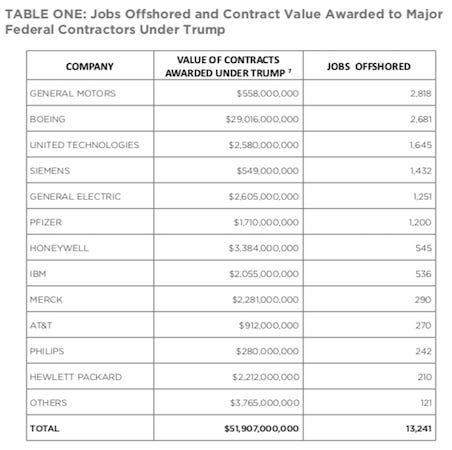By David J. Sirota
Here’s an open secret: right now, your federal tax dollars subsidize giant CEO pay packages as well as corporate efforts to bust unions and offshore jobs. But when Donald Trump is defeated in 2020, that will end with a stroke of President Bernie Sanders’ pen — and big corporations like Amazon, Honeywell and Boeing will have to either change their behavior, or lose their government largesse.
At issue is Bernie’s brand new Workplace Democracy Plan, set to be introduced by Bernie today at the Iowa AFL-CIO convention. The initiative is a comprehensive package of reforms designed to strengthen workers’ ability to form unions.
One provision in the plan is a pledge to immediately issue an executive order banning federal contracts from being awarded to companies “that outsource jobs overseas, pay workers less than $15 an hour without benefits, refuse to remain neutral in union organizing efforts, pay executives over 150 times more than average workers, hire workers to replace striking workers, or close businesses after workers vote to unionize.â€
Bloomberg News has reported that in the Trump era, billions of dollars of federal contracts are flowing to companies that offshore jobs.

The same is true for companies that give their executives exorbitant pay packages while trying to block their workers from exercising their workplace rights.
That means when Bernie signs the executive order, lucrative contracts to major companies could be in jeopardy. Among the companies that could lose big contracts are:
• AMAZON: Jeff Bezos’ company has been a federal contractor for the CIA, and remains a federal contractor today. Indeed, the company is currently embroiled in a scandal surrounding its attempt to secure a $10 billion Pentagon contract. At the same time, Amazon has worked to prevent its low-paid workers from joining unions. Gizmodo recently reported that “a 45-minute union-busting training video produced by the company was sent to Team Leaders†at its grocery subsidiary — and in the video, the company declares “we are not neutral†when it comes to unions. That echoes Amazon’s past behavior: Time magazine reported that when facing a union drive in 2014, “Amazon brought in a law firm that specializes in fighting off organized labor†and “held employee meetings during which management tried to discourage votes in favor of the union.â€
• HONEYWELL: One of the largest defense contractors, Honeywell’s CEO has been paid more than 300 times what his company’s median worker is paid. In 2016, The Guardian reported that Honeywell “locked out the members of the United Automobile Workers (UAW) and brought in replacement workers†after the workers “they voted overwhelmingly to reject a proposed contract that they say contained a significantly worse health plan.†The company faced an NLRB complaint that was later short circuited by the Trump administration. That followed a 2011 report showing that “for the third time in three years, defense contractor Honeywell International Inc. is deploying union-busting tactics in a government-affiliated workplace.â€
• MCKESSON: A 24/7 Wall Street report found that McKesson receives “billions of dollars from U.S. taxpayers.†The company’s CEO has raked in “$639 million in total compensation in the last decade alone,†according to Fortune. The company — which has been in the middle of the opioid scandal — has a CEO-to-worker pay ratio of 473 to 1. In 2014, Law360 reported that an National Labor Relations Board judge ruled that McKesson “ran afoul of federal labor law by soliciting employees in a bid to decertify a union at a Florida facility.†In 2013, the Teamsters said that McKesson “hired a union-busting law firm and threatened and intimidated its workers in Lakeland, Fla., who voted for Teamster representation.â€
• GENERAL MOTORS: The automaker has received hundreds of millions of dollars of government contracts, while moving its production out of the United States. Indeed, the company recently announced big layoffs in the Midwest, while boosting its operations in Mexico. Meanwhile, the company last year recorded big profits, paid its CEO 295 times more than the average GM worker, and received “a tax refund of $104 million on $11.8 billion in profits,†according to the Detroit Free Press.
• BOEING: The aviation giant is one of the largest federal contractors – and has been repeatedly accused of union busting. This week, Bloomberg reports that “federal investigators concluded there’s merit to nine unfair labor practice charges filed†against the company, including “allegations that six workers were illegally fired last year in retaliation for openly supporting the union.†Earlier in the year, The Guardian reported that “Boeing’s mere presence in South Carolina was already viewed as a union-busting move when the company first opened an aircraft production plant there in 2011 rather than Washington state, where Boeing had unionized operations.†In 2018, the company’s CEO made 166 times the typical Boeing worker.
• UNITED TECHNOLOGIES: Last year, United Technologies, the corporation that owns Carrier, made $5.3 billion in profits while receiving big federal contracts and paying its CEO over $18.4 million in compensation – 257 times more than its median worker. A few years ago, it began shipping jobs from its plants in Indiana to Mexico, despite Trump’s promise that he would save all of their jobs and force United Technologies to “pay a damn tax.â€
Of course, there is one way for these companies to avoid losing their federal contracts under a Bernie Sanders administration: they could simply start paying their workers better, stop their union-busting and stop offshoring jobs.
David J. Sirota is an American political commentator and radio host based in Denver. He is a nationally syndicated newspaper columnist, political spokesperson, and blogger.
This article appeared on August 21 here.
